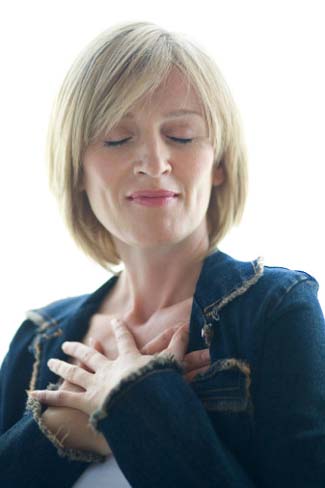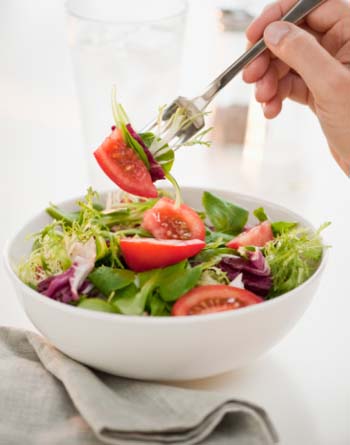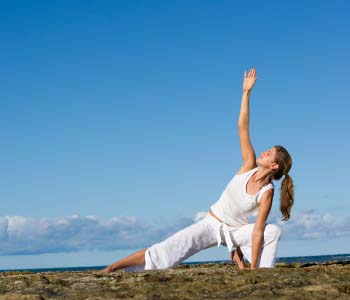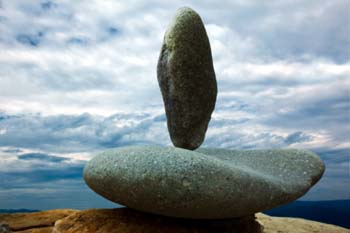Feb 22, 2026
Feb 22, 2026
The most basic of activities have a profound influence on our well-being. Yet it is these very basic activities that are often accorded second, third or last place in our daily lives. It is time to take a good hard look at our daily routines and re-learn the basics that are essential for health and longevity.
Breathe!
 Breath is essential for survival, and breathing the first and most basic activity we learn. On average, we breathe 22,000 times a day, and how we breathe is crucial to good health and longevity. The deeper, slower and smoother we breathe, the more prana (life-force) we provide to the physiology. Deep breathing forces us to slow down and relax, helping over the long-term to fight the effects of stress. From the perspective of modern science as well, more oxygen to the blood, brain and muscles helps elevate energy levels and maximize mental performance. But because of sheer lack of attention to this most basic of functions and the multiple stressors we are bombarded with all day long, few of us remember to breathe deeply or correctly. We take quick shallow breaths hurriedly, often through the mouth instead of the nose, as we rush about our daily activities. It's time to re-learn how to breathe for health and longevity.
Breath is essential for survival, and breathing the first and most basic activity we learn. On average, we breathe 22,000 times a day, and how we breathe is crucial to good health and longevity. The deeper, slower and smoother we breathe, the more prana (life-force) we provide to the physiology. Deep breathing forces us to slow down and relax, helping over the long-term to fight the effects of stress. From the perspective of modern science as well, more oxygen to the blood, brain and muscles helps elevate energy levels and maximize mental performance. But because of sheer lack of attention to this most basic of functions and the multiple stressors we are bombarded with all day long, few of us remember to breathe deeply or correctly. We take quick shallow breaths hurriedly, often through the mouth instead of the nose, as we rush about our daily activities. It's time to re-learn how to breathe for health and longevity.
Pranayama is a traditional series of breathing exercises often taught with yoga. If you can, find a good yoga instructor to instruct you in this ancient science of breathing for health. Even if you do not learn pranayama, stay attentive to how you breathe, and you will automatically start to breathe deeper and slower. It is also good to set aside some times during the day for aware breathing - as upon awaking, before going to bed, before workouts, before and during meditation etc. Deep breathing before bed can hasten sleep and improve the quality of sleep. Breathing deeper before exercising helps enhance energy levels and increase the output from your workouts. During times of pressure, sit down and breathe deeply before you respond.
Drink water
 The elixir of life is the second most important ingredient for well-being, and again, one that is often overlooked by many of us. Water is essential not only for re-hydration but also forms the basis of good blood, dewy skin and healthy body tissues. Every cell in your body, as well as the space between cells, every tissue and every organ needs water. From the perspective of modern science as well, drinking about one-half of your weight in fluid ounces of water each day is essential for health. While Ayurvedic healers do not specify a blanket quantity, they recommend using your urine as a guide to whether you need to drink more water - if your urine is not clear or it looks too concentrated, you need more water. Inadequate water can cause headaches and grogginess and more severe dehydration has even more serious health repercussions. As we grow older, our body's thirst signals become weaker, and it is then even more important to remember to drink enough water through the day.
The elixir of life is the second most important ingredient for well-being, and again, one that is often overlooked by many of us. Water is essential not only for re-hydration but also forms the basis of good blood, dewy skin and healthy body tissues. Every cell in your body, as well as the space between cells, every tissue and every organ needs water. From the perspective of modern science as well, drinking about one-half of your weight in fluid ounces of water each day is essential for health. While Ayurvedic healers do not specify a blanket quantity, they recommend using your urine as a guide to whether you need to drink more water - if your urine is not clear or it looks too concentrated, you need more water. Inadequate water can cause headaches and grogginess and more severe dehydration has even more serious health repercussions. As we grow older, our body's thirst signals become weaker, and it is then even more important to remember to drink enough water through the day.
While we need to drink a lot of water through the day, it's important to sip the water over time rather than gulp down large quantities at a time. Do not drink too much water just before or during a meal. Ayurvedic healers also recommend spice teas - water boiled with therapeutic spices for added health benefit. Also, remember that it's important to drink water-milk, caffeinated and alcoholic drinks do not count. Fruits and vegetables with high water content, fruit and vegetable juices and clear soups suited to your constitution are helpful, but it is also important to drink just plain pure water each day. Make sure the water you drink is pure; have your drinking water tested for purity and use a good filter.
Eat Right
 This is an exhortation Ayurvedic healers never tire of voicing over and over again. The right kind and quantity of food is so important that it is accorded an even higher status than medicine in Ayurveda. 'Annaha brahmaha' goes the Ayurvedic saying - Food is divine. Eating inappropriate foods or following poor eating routines and habits not only have short-term repercussions on energy levels, mental clarity and emotional well-being, they also seriously damage health and well-being over the long-term sometimes causing irreversible damage to the physiology and shortening our life-span.
This is an exhortation Ayurvedic healers never tire of voicing over and over again. The right kind and quantity of food is so important that it is accorded an even higher status than medicine in Ayurveda. 'Annaha brahmaha' goes the Ayurvedic saying - Food is divine. Eating inappropriate foods or following poor eating routines and habits not only have short-term repercussions on energy levels, mental clarity and emotional well-being, they also seriously damage health and well-being over the long-term sometimes causing irreversible damage to the physiology and shortening our life-span.
Ayurvedic healers do not have a one-size-fits-all approach to diet and nutrition. Your dietary needs are unique to you, and you have to develop the diet that is ideal for you over time. There are general guidelines for food choices for people with more or less of each of the three doshas - vata, pitta and kapha -in their prakriti (original constitution) and vikriti (current state of the doshas), but within these general guidelines you can choose what works best for you. Listen to your physiology carefully and it will guide you to the foods that enhance not just your physical but also mental and emotional balance. Whatever your food choices, eat pure, fresh, whole, natural foods.
Follow a good eating routine. Do not take short-cuts with your meals, sandwiching them between other activities. Treat mealtimes as sacred. Prepare and cook your food with loving care and attention and eat in silence or in a harmonious atmosphere. Prepared lovingly and eaten with gratitude and reverence, the food will turn to ojas in your system - the substance that Ayurveda defines as the essence of life and the finest product of the eating and digestion process.
Sleep
 Another basic for health and longevity, sleep is becoming a rare commodity for many in our frenetic, 24/7 society. According to Ayurveda as well as modern science, sleep is essential for our minds and bodies to recharge and prepare for the next day. Lack of sleep impairs the digestion, contributes to ama accumulation, clouds the brain and places greater demands on every part of the physiology with each passing day. Modern science has linked sleep deprivation to elevated blood pressure, obesity and depression.
Another basic for health and longevity, sleep is becoming a rare commodity for many in our frenetic, 24/7 society. According to Ayurveda as well as modern science, sleep is essential for our minds and bodies to recharge and prepare for the next day. Lack of sleep impairs the digestion, contributes to ama accumulation, clouds the brain and places greater demands on every part of the physiology with each passing day. Modern science has linked sleep deprivation to elevated blood pressure, obesity and depression.
Ayurveda does not prescribe eight hours of sleep each night for everyone. You have to determine the sleep quota that is adequate for you to function at peak levels by monitoring your sleep and activity levels over a period of time. Times of extra pressure need to be compensated with extra sleep time.
The quality of sleep is as important as the quantity of sleep you get. Ayurveda defines the most productive sleep as occurring when the mind, the charioteer of the senses, is completely disengaged from the senses. Sleep obtained in the earlier part of the night is more productive, so go to bed early, definitely before 10 pm, and arise early, before 6 am. Aromatherapy, a soothing cup of herbal tea, deep breathing and a bedtime lower limb massage can all help you fall asleep easier and enjoy a deeper, more restful quality of sleep. Abhyanga, the daily Ayurvedic massage, is also helpful for promoting a better quality of sleep.
Exercise
 Just as good quality sleep at night is essential to help the physiology recharge, adequate levels of physical and mental activity during the day are important for well-being and longevity. The Ayurvedic daily routine encompasses both physical exercise and mental activity, and the view of modern science as well is that the admonition - use it or lose it - is equally valid for your muscles as it is for your brain.
Just as good quality sleep at night is essential to help the physiology recharge, adequate levels of physical and mental activity during the day are important for well-being and longevity. The Ayurvedic daily routine encompasses both physical exercise and mental activity, and the view of modern science as well is that the admonition - use it or lose it - is equally valid for your muscles as it is for your brain.
As with diet and sleep, Ayurvedic healers recommend structuring an exercise program that is ideal for your needs. If you are trying to balance Kapha dosha, for instance, you would choose more robust forms of exercise such as aerobics, singles tennis or long-distance jogging. If you are trying to keep Pitta in balance, swimming in summer and skiing in winter might be options to investigate. Walking and yoga are universally beneficial because they can be tailored to individual needs, and convenient because they need no special equipment, can be done alone and everyday.
Exercise early in the day for increased energy levels during the day and ease of falling asleep at night. Do not exercise on an empty stomach or just after a meal. Do not exercise to the point of pain or exhaustion. Moderation in exercise is the key to balance.
To stay in shape mentally, make lifelong learning an integral part of life. Travel, enjoy new experiences, read, do puzzles, or take up a new hobby or project to keep the mind sharp and alert. Gardening, music, teaching and volunteering are examples of activities that can be mentally enriching and emotionally and spiritually rewarding. If your work involves intense mental activity, stay recharged by taking frequent short breaks to breathe deeply, stretch or drink some water.
Meditate
 Take thirty minutes each day to recharge body, mind, senses, heart and spirit with meditation. Research shows that meditation helps enhance your ability to manage stress, it promotes mental clarity and emotional balance and does wonders for physical health from promoting good sleep to reducing hypertension.
Take thirty minutes each day to recharge body, mind, senses, heart and spirit with meditation. Research shows that meditation helps enhance your ability to manage stress, it promotes mental clarity and emotional balance and does wonders for physical health from promoting good sleep to reducing hypertension.
Meditation can be done in the morning or the evening or both morning and evening. Meditate in a silent, serene atmosphere, in a room free of clutter or amid nature. Sit erect, facing east or north, and start with a few minutes of aware breathing before beginning your meditation. After your meditation, take a few minutes to rest quietly before resuming your daily routine. The aroma of pure sandalwood and Ayurvedic herbs such as Brahmi can help enhance the quality of your meditation.
Shreelata Suresh is a yoga instructor from the Bay Area, and she writes on yoga and Ayurveda for different publications. To subscribe to free newsletters on Ayurveda, or for more information, please visit http://www.ayurbalance.com.
Disclaimer:
Information provided in this article is for the sole purpose of imparting education on Ayurveda and is not intended to diagnose, treat, cure or prevent any disease. If you have a medical condition, please consult your physician.
09-May-2004
More by : Shreelata Suresh

|
Very informative and balanced write up, thank you. If one follows these steps it helps a lot. |